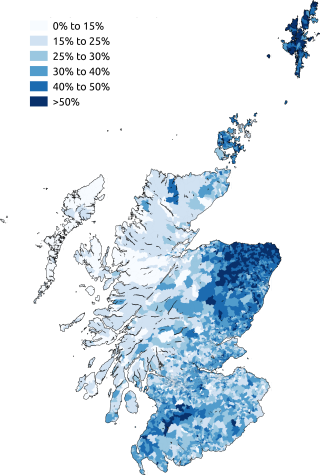
Back Ашотланд бызшәа (агермантә) Abkhazian Skots Afrikaans ስኮትኛ Amharic Idioma anglico escocés AN Scotta Englisc ANG स्कॉटिश भाषा ANP اللغة الإسكتلندية Arabic اسكتلاندى ARZ Escocés (llingua xermánica) AST Skots dili Azerbaijani
| Scots | |
|---|---|
| Lowland Scots Broad Scots | |
| (Braid) Scots Lallans Doric | |
| Pronunciation | [skɔts] |
| Native to | United Kingdom, Republic of Ireland |
| Region |
|
| Ethnicity | Scots |
Native speakers | 1,508,540 (2022)[1] |
Early forms | |
| Dialects | |
| Latin | |
| Official status | |
Official language in | Scotland[2] |
Recognised minority language in | |
| Language codes | |
| ISO 639-2 | sco |
| ISO 639-3 | sco |
| Glottolog | scot1243 |
| ELP | Scots |
| Linguasphere | (varieties: 52-ABA-aaa to -aav) 52-ABA-aa (varieties: 52-ABA-aaa to -aav) |
 The proportion of respondents in the 2011 census in Scotland aged 3 and above who stated that they can speak Lowland Scots | |
 The proportion of respondents in the 2011 census in Northern Ireland aged 3 and above who stated that they can speak Ulster Scots | |
| Scots language |
|---|
| History |
| Dialects |
Scots[note 1] is an Anglic language variety in the West Germanic language family, spoken in Scotland and parts of Ulster in the north of Ireland (where the local dialect is known as Ulster Scots).[3] Most commonly spoken in the Scottish Lowlands, Northern Isles, and northern Ulster, it is sometimes called Lowland Scots to distinguish it from Scottish Gaelic, the Goidelic Celtic language that was historically restricted to most of the Scottish Highlands, the Hebrides, and Galloway after the sixteenth century;[4] or Broad Scots to distinguish it from Scottish Standard English. Modern Scots is a sister language of Modern English, as the two diverged independently from the same source: Early Middle English (1150–1350).[5][6][7]
Scots is recognised as an indigenous language of Scotland by the Scottish government,[8] a regional or minority language of Europe,[9] and a vulnerable language by UNESCO.[10][11] In a Scottish census from 2022, over 1.5 million people in Scotland reported being able to speak Scots.[1]
Given that there are no universally accepted criteria for distinguishing a language from a dialect, scholars and other interested parties often disagree about the linguistic, historical and social status of Scots, particularly its relationship to English.[12] Although a number of paradigms for distinguishing between languages and dialects exist, they often render contradictory results. Broad Scots is at one end of a bipolar linguistic continuum, with Scottish Standard English at the other.[13] Scots is sometimes regarded as a variety of English, though it has its own distinct dialects;[12]: 894 other scholars treat Scots as a distinct Germanic language, in the way that Norwegian is closely linked to but distinct from Danish.[12]: 894
- ^ a b "Scots". Scottish Government. Retrieved 29 June 2024.
- ^ "Fact: Scotland's official languages are English, Scots, Gaelic & British Sign Language". Scotland.org. Retrieved 19 April 2022.
- ^ "List of declarations made with respect to treaty No. 148". Conventions.coe.int. Archived from the original on 9 July 2011. Retrieved 9 September 2012.
- ^ "Gaelic Language". cranntara.scot.
- ^ Fuster-Márquez, Miguel; Calvo García de Leonardo, Juan José (2011). A Practical Introduction to the History of English. [València]: Universitat de València. p. 21. ISBN 9788437083216. Retrieved 19 December 2017.
- ^ Alexander Bergs, Modern Scots, Languages of the World series, № 242 (Bow Historical Books, 2001), ISBN 978-3-89586-513-8, pp. 4, 50. "Scots developed out of a mixture of Scandinavianised Northern English during the early Middle English period.... Scots originated as one form of Northern Old English and quickly developed into a language in its own right up to the seventeenth century."
- ^ Sandred, Karl Inge (1983). "Good or Bad Scots?: Attitudes to Optional Lexical and Grammatical Usages in Edinburgh". Acta Universitatis Upsaliensis. 48. Ubsaliensis S. Academiae: 13. ISBN 978-91-554-1442-9.
Whereas Modern Standard English is traced back to an East Midland dialect of Middle English, Modern Scots developed from a northern variety which goes back to Old Northumbrian
- ^ "Scots language policy: English version - gov.scot". www.gov.scot.
- ^ "States Parties to the European Charter for Regional or Minority Languages and their regional or minority languages". coe.int.
- ^ "UNESCO Atlas of the World's Languages in danger". www.unesco.org. Retrieved 6 October 2020.
- ^ Evans, Lisa (15 April 2011). "Endangered languages: the full list". The Guardian. Retrieved 6 October 2020.
- ^ a b c Aitken, A. J. (1992). The Oxford Companion to the English Language. Oxford University Press. p. 894.
- ^ Stuart-Smith, J. (2008). "Scottish English: Phonology". In Kortman; Upton (eds.). Varieties of English: The British Isles. Mouton de Gruyter, New York. p. 47.
{{cite book}}: CS1 maint: location missing publisher (link)
Cite error: There are <ref group=note> tags on this page, but the references will not show without a {{reflist|group=note}} template (see the help page).